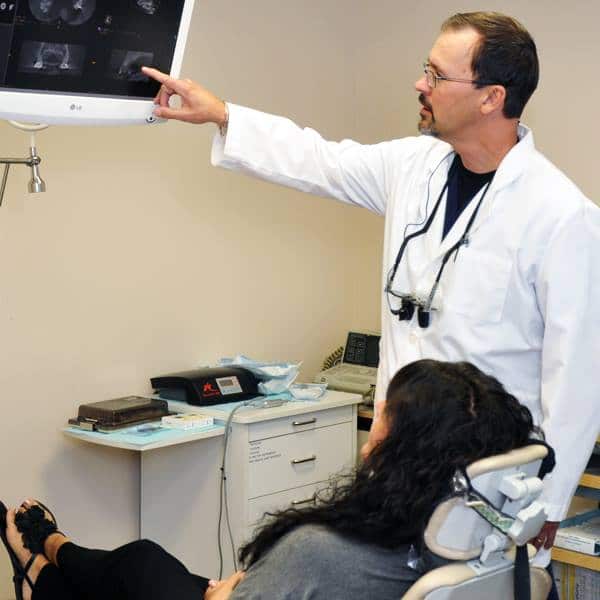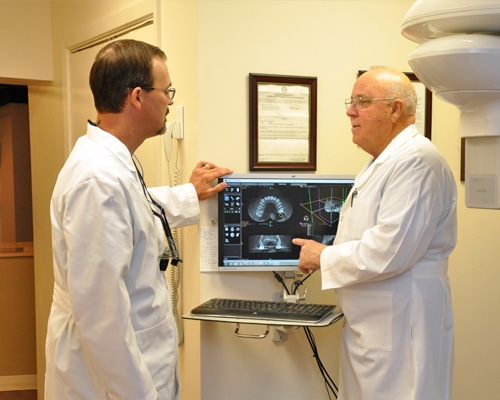Checkout Dr. Steven Maller, DDS, MS Watch Video
Dr. Steven C. Maller DDS, MS earned his DDS degree from the University of Nebraska-Lincoln in 1992 and received a direct commission as a captain in the U.S. Air Force Dental Corps upon his graduation. Dr. Maller toured as a comprehensive dentist for four years at various Royal Air Force Bases in the United Kingdom before entering the USAF Periodontics Residency program at Wilford Hall Medical Center, graduating in 2000 with a Specialty Certificate in Periodontics and a Master of Science degree in Periodontics from the University of Texas Health Science Center in San Antonio. During his tenure in the USAF, Dr. Maller has served as Director of Clinical Periodontics and Director of Resident Education and Training.
Dr. Maller has been married to his wife since 1992 and is the proud father of 2 boys, Sam and Ethan. When not at work, Dr. Maller enjoys spending time with family, playing guitar and volunteering at Concordia Lutheran Church.
DENTAL IMPLANTS
What Are Dental Implants?
If you have damaged or missing teeth, dental implants might be the perfect solution for you. A dental implant is essentially an artificial tooth or teeth that are rooted into the jawbone, functioning and looking like natural teeth. There are two types of dental implants: endosteal and subperiosteal implants. Endosteal implants are roots or screws that are implanted right into the jaw and have an artificial tooth attached to them. Subperiosteal implants include a metal frame that is fitted, and eventually becomes fixed, to the jawbone. Once the frame is attached, artificial teeth are placed on posts attached to the aforementioned frame.
How are They Different from Natural Teeth?
We have great news! Aside from surgical implantation and a few other small differences, the maintenance and function of dental implants are essentially the same as a natural tooth. Artificial implants look and function just like natural teeth, so it’ll be like they were never gone! After a few days, you’ll forget you even have an implant.
Should You Get Dental Implants?
Ultimately, you need to speak with your dentist about whether dental implants are right for you. Evaluate the pros and cons of implants as it pertains to your unique case and set up an appointment with us to discuss your options.
BONE GRAFTING
What is Bone Grafting?
In a person suffering from periodontal disease, the bones that hold the tooth in place are often destroyed by the toxins produced by the interaction between their enzymes and bacteria. Bone grafting is used to replace this bone, either using synthetic bone, donated bone or bone taken from the patient themselves.
Why Get Bone Grafting Done?
As mentioned above, when the bone that holds the tooth in place is destroyed, there is nothing to anchor the tooth in place. Also, the site would no longer be suitable for dental implants due to the lack of space to secure an implant into the bone. Bone grafts can help to encourage bone regrowth, providing stability to teeth or allowing for secure implantation of a dental implant.
SCALING & ROOT PLANING
What is Scaling and Root Planing?
We promise, it’s not as scary as it sounds. In fact, this isn’t even a surgical procedure, but more of a deep cleaning. We might recommend that you undergo this treatment if you have a buildup of plaque and calculus that we feel is currently causing issues or could cause problems in the future.
Scaling
Scaling, done under local anesthetic, entails using a specialized dental tool, called an ultrasonic scaling tool, to scrape away plaque, tartar and calculus that has accumulated above and below the gum line. In many cases, an oral irrigation is also performed, which is used to reduce bacteria below the gum line by delivering an antimicrobial agent. The main purpose of this procedure is to remove bacteria from below the gum line that may have been contributing to periodontal disease. Hopefully, with the help of this procedure, we can get you as close to a clean slate in your oral health as possible. That way, you can redouble your oral healthcare efforts without old bacteria standing in the way.
Root Planing
If you have rough spots in your roots, we might recommend that you undergo root planning. Rough spots on your roots make it difficult for your gums to attach to your teeth at the proper places, causing pockets to form. These rough spots also provide the perfect spot for damaging bacteria to hide and periodontal disease to develop and fester. During a root planing procedure, your roots will be smoothed, cleaned, scraped and disinfected in order to remove bacteria and give your gums a clean, smooth surface to reattach to your teeth.
PERIODONTAL DISEASES
Periodontal disease affects your gums, presenting itself in many ways depending on the level of severity. Generally, periodontal disease occurs when plaque builds up on your teeth, eventually developing into tartar. This causes the inner-layer of gum and bone to pull away from the tooth, creating a pocket. This pocket then fills with the debris of the things you eat and drink, eventually becoming infected. As your enzymes try to fight off the infection, toxins are produced that will break down the bone and tissue that hold your teeth in place. Because this disease is often painless, many people who suffer from it don’t realize it until it’s too late. In the early stages, known as gingivitis, periodontal disease is still fixable with a professional tooth cleaning coupled with diligent at-home dental care, including brushing twice a day and flossing daily. It is important that you know what to look out for so that you can catch the signs before it’s too late. Contact us immediately if you experience:
- Gums that are tender, red and/or swollen
- Frequent or easily bleeding of gums
- Seemingly incurable bad breath or bad taste in your mouth
- Gums pulling away from the tooth
- Loose permanent teeth
- Changes in your bite
- Changes in the fit of permanent dentures
Types of Periodontal Disease
“Periodontal disease” is an umbrella term that describes a range of gum diseases of different severities. Periodontal disease can present itself in many forms, so it is important that you know what to look out for. Here are the different types of periodontal disease:
- Gingivitis – This is an early stage of periodontal disease, so it is significantly milder than later stages. There isn’t typically much discomfort felt at this stage, which is why it is important to look out for warning signs like red, swollen and/or bleeding gums. At this point, the disease is reversable, so be sure to speak to us if you notice any of the aforementioned symptoms. It’s better to be safe than sorry.
- Chronic Periodontitis – The most common form of periodontal disease, chronic periodontitis presents itself through inflammation in the gums and bone loss. Generally, this most commonly occurs in adults, but it can develop at any age.
- Aggressive Periodontitis – This disease generally presents itself in patients who have no other health problems. Typically running in families, people who suffer from this condition often experience rapid bone destruction and loss of attachment between the gums and the teeth.
- Manifestation of Systemic Diseases Through Periodontitis – Systemic diseases, like heart disease, stroke and lung disease, are often linked to poor gum health. Therefore, systemic diseases sometimes physically manifest as periodontitis.
- Necrotizing Periodontal Disease – This is an infection that causes the death of cells in the gums, periodontal ligament and alveolar bone. Conditions like HIV are usually the cause of this kind of necrosis.






